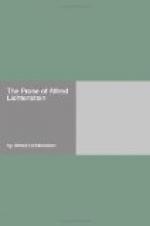Kuno Kohn was not thinking of anything special. He hummed to himself: “A fog has so gently destroyed the world.” The poet Gottschalk Schulz, a lawyer, who had painfully flunked all the tests he had taken, greeted him. A beautiful girl was with him. They both sat down at Kohn’s table. Schulz and Kohn collaborated with the enthusiastic little Lutz Laus, to produce a monthly journal, “The Dachshund,” designed to refine the level of immorality. Schulz told Kohn that the Dachshund-Laus would soon invent a godless religion on neo-legal principles, for which purpose he intended to call an organizational meeting in a nearby movie-house. Shaking his head, Kohn listened. The lovely girl ate cake. Kohn said sadly: “Laus can touch people and get things done. But there is no longer a Jesus to make us believe. We die every day more deeply into empty, eternal death. We are hopelessly pulled apart. Our life will remain meaningless theatrics”. As she ate, the girl looked on, with a cheerful look emanating from the uncomprehending reddish brown eyes on her clear face. Schulz had sunken into gloomy thoughts. The girl said that her whole life also was a spectacle, and therefore she didn’t find it to be so meaningless. In the acting school, in which she was preparing for a career on the stage as a sentimental lover, hard work was done. Mr. Kohn ought to drop in sometime, to convince himself about it. Kuno Kohn looked at the girl ardently for a while. He thought: “Such a small, stupid girl.” But he soon left.
Outside, the lyric poet Roland Rufus suddenly seized his arm firmly and excitedly, saying: “Have you read the review written by a certain Bruno Bibelbauer in the monthly medical journal, in which it is claimed that the reason for my paranoia is that I imagine that I have some paralysis. Everyone looks at me strangely; I am famous. My publisher is giving me a large advance. But—ah, I must not say it—I am incurable.” He went immediately into a better wine-restaurant.
A horse hobbled by, pulling a carriage, like an old man. The hunchback Kohn idly leaned against a Catholic church, thinking about existence. He said to himself: “Yet how odd existence really is. And yet one props oneself up, somewhere, somehow, without connection, irrelevant; one could just as well continue for better or for worse, anywhere. That makes me unhappy.” Before him a small, silent whore’s dog had stopped, had listened humbly, with glowing eyes.
A fiery glass wedding coach hopped by. Inside, in a corner, he saw the pale, expressionless face of a bridegroom. An empty carriage arrived and Kohn climbed in. He said quietly: “A seeker without a goal... a man drift...... unknown to everyone... One has a frightening longing. O that one might know for what.”
The streets glimmered whitely when he opened the door of the house in which he lived. In his room he looked silently, with a solemn sadness, at the pictures of men, all of whom were dead, which were fastened to the wall. Then he began to remove the articles of clothing from his hump. When he was wearing only undershorts, a shirt, and socks, he said, murmuring and sighing, “Gradually one goes insane...”




